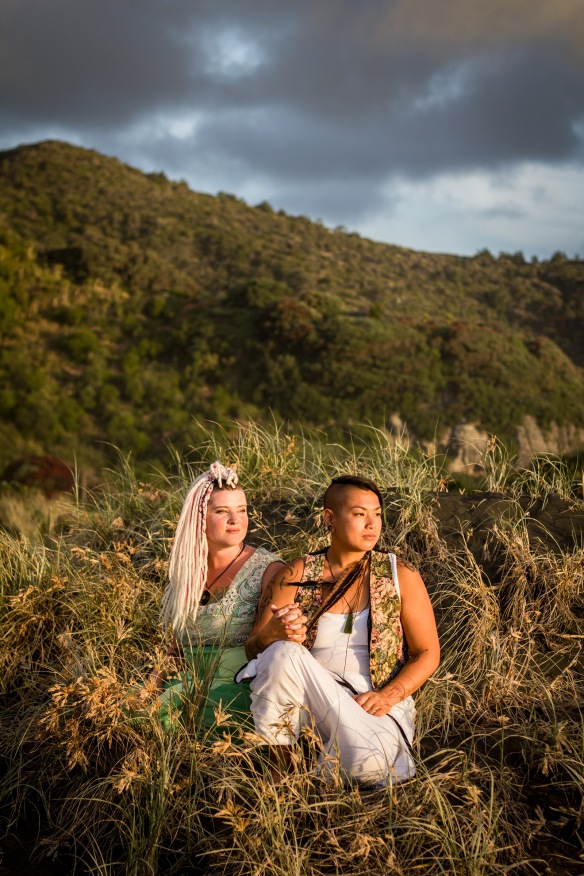
Rudo Greissworth and Joydah Bernardo on their wedding day (photograph courtesy of Rudo and Joydah)
We met Rudo and Joydah in Lexington in the late summer of 2014, just after we launched Love Letter To the World and only a few months before they got married on a beach in New Zealand. We made fast friends—it’s hard not to with them! Before they left Lexington to travel back to New Zealand, Joydah got a Love Letter tattoo: she chose the phrase “love you black.”
Here is the story sweet Rudo just sent us from New Zealand:
“I came to New Zealand with one family contact back in 2006. My dear friend Nikki (now living in Lexington but born in New Zealand) has a sister in Auckland, so when I told Nikki I wanted to visit NZ after I toured Australia, Nikki connected me with her family. Kristi and her husband Graham are the sweetest people, and enveloped me in their arms the minute I arrived. Graham is Maori; he began my lessons in Maori culture and historical significance. He explained to me that his generation really suffered in the schooling system when he was child. He was fluent in Maori as a child, but since speaking in Maori was prohibited in schools, he has never been able to recover his fluency.
Education in Maori culture is part of the curriculum now, so all school children are exposed to basic beginnings of Te reo Māori (Maori language). In fact, all government publications have to be translated into Maori. In a few short generations, the energy has really shifted. All people my age (babies of the 80s and 90s) have been taught Maori nursery rhymes, can say a few things like where they’re from and who their family or tribe is, and have lovely pronunciation!
Bob Marley came to NZ in 1979 and found a strong link between the passion for cultural freedom of expression for the natives of Jamaica and New Zealand. Racial tension is openly talked about here, and politicians do not shy away from the dialogue of Crown vs. Maori law. This is certainly not a typical colonial nation. The Maori people are loud, proud, HEAVILY tattoo’d, and have quite a lot of political clout and land ownership (most would say NOT ENOUGH yet). Almost every town has multiple marae (community and sacred gathering spaces) because there are so many iwi (tribes). Bear in mind these are all my thoughts, and not intended to be a history of New Zealand by any means!!!!
As to Love Letter To the World … in 2014 I came back to Auckland after a lovely Lexington visit and carrying with me a stack of cards and a dream in my heart to bring the beautiful poem to Aotearoa (New Zealand). I first approached my adopted father (of sorts) Graham, who quickly reminded me he was not fluent enough to carry out a good translation. I was working for Auckland Transport, which is part of Council. I had plenty of workmates to ask.
I first approached my friend Shawn because he was studying at Auckland University of Technology to gain his Bachelor of Arts in Māori Development. He had access to lots of people and he began to work on the poem. He took a LONG time, in part because everything in New Zealand takes a long time (we call it Island Time) and in part because he was getting a lot of viewpoints. He enjoyed showing the poem to multiple professors and Maori elders. He told me that they really liked playing with the words and meanings. I never got to meet the group. In the end, I only got about half the poem translated over a year later!
In that year I had met a lovely woman from Christchurch who taught at a Kura Kaupapa Māori (Maori immersion school). She was HAPPY to work on a translation. Our most poignant conversation during her work on the poem was when she asked me if ‘love you black’ was a typo. I was so excited to talk to her about Frank X Walker’s background and oeuvre. Urupikia would love to do more work on translation projects; several of her friends work for Maori TV to translate popular kids’ shows into Te Reo. Urupikia really enjoyed reading and rereading the poem, trying to capture its spirit, not just trade word for word, which she commented had been done on the first translation attempt.
I’ve recently met another woman, Kara, who is half Jamaican and half Maori. She has excitedly agreed to record the audio. She is a poet herself, so I am just thrilled to get the ball rolling on that. Maori is a very oral language and HAS to be heard to appreciate. Though it’s taken me about 2 years, it’s been worth the wait to see how things have unfolded.
In terms of getting tattoo artists on board, well, that’s yet to unfold. I think it’s just around the corner, too. Joydah will definitely be getting her favorite line (‘love you black’) done again, this time in Te Reo, though we’ll have to figure out how to trim it down. I definitely want the title, though I may go with a Shona translation since I was born in Zimbabwe and my name actually MEANS love in the Shona language.
So I guess it’s all still forming, coming out of the mist like a magical kingdom yet far away.”
If you’d like to catch a glimpse of Joydah’s tattoo, watch the video on the artwork website. Keep refreshing and playing it again: it is different and beautiful every single time.
